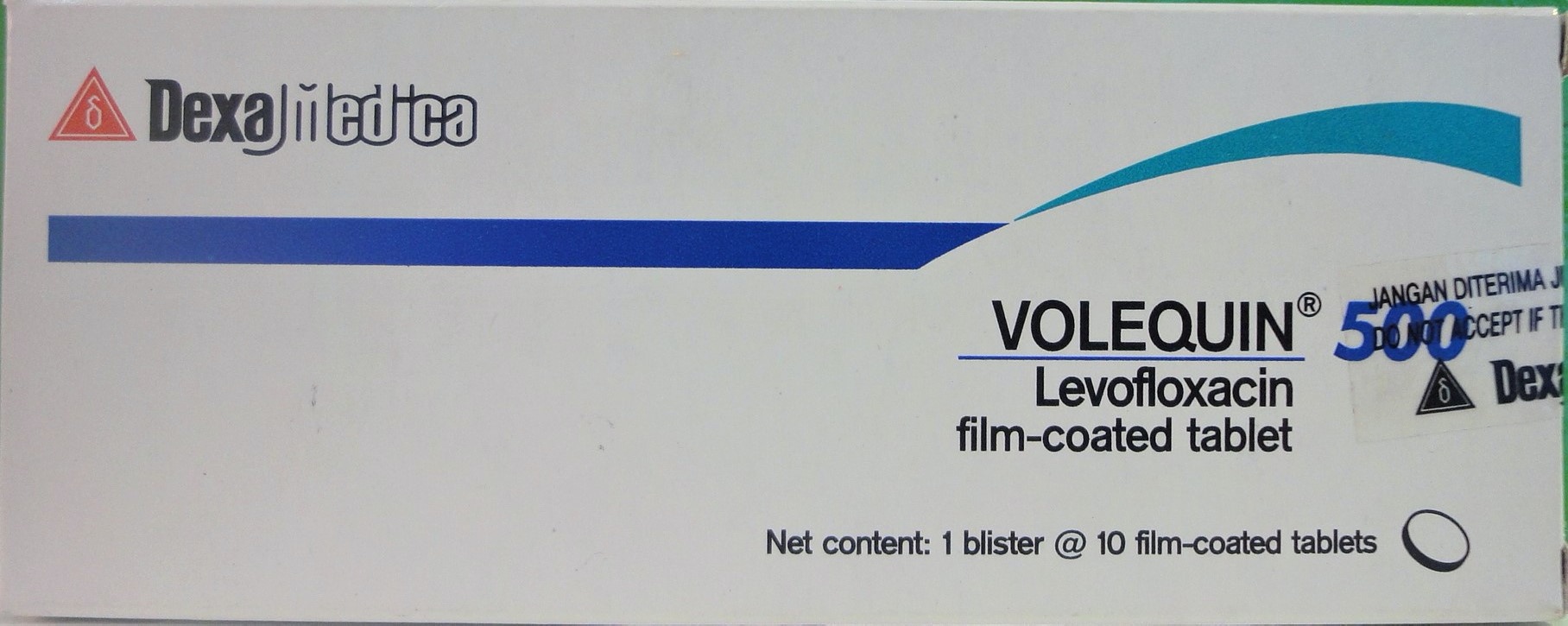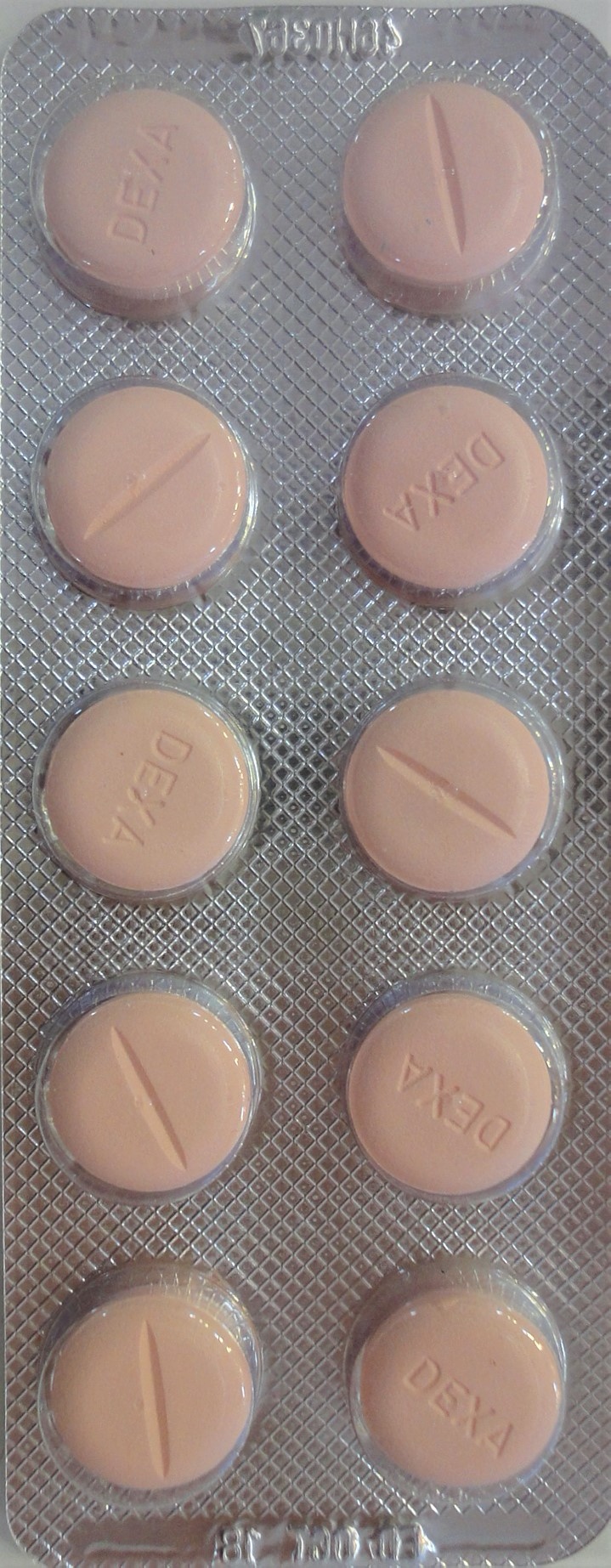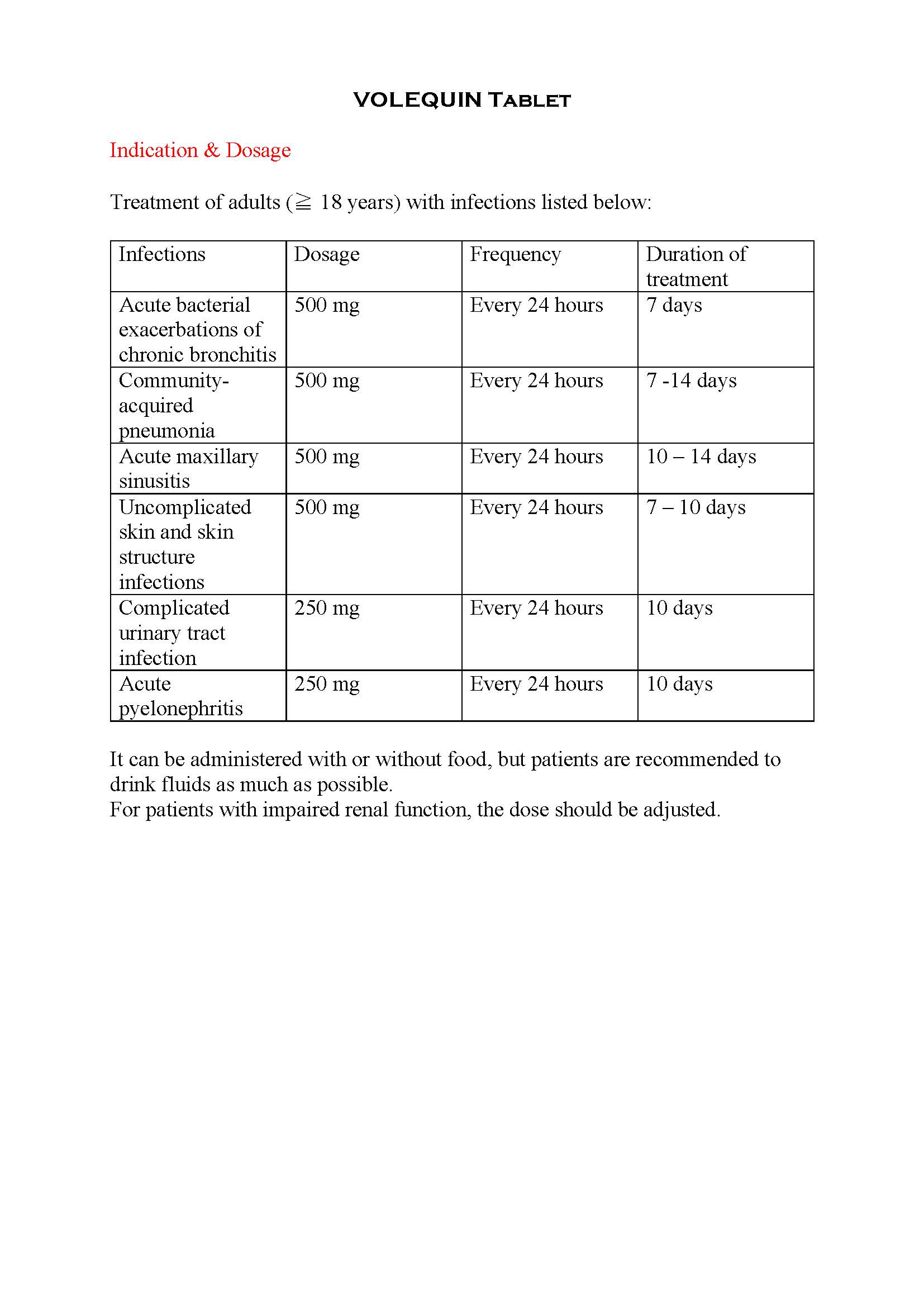VOLEQUIN Tablet
ក្រុមហ៊ុនផលិតឱសថ:
Dexa Media, Indonesia
ក្រុមហ៊ុនចែកចាយឱសថនៅប្រទេសកម្ពុជា:
Dynamic Pharma


- សារធាតុសកម្ម
- ប្រសិទ្ធិភាពព្យាបាល និង កម្រិតប្រើប្រាស់
- ហាមប្រើ
- ផលរំខាន
- អន្តរប្រតិកម្ម
- ស្ត្រីមានផ្ទៃពោះ និង ស្ត្រីបំបៅដោះកូន
- ការប្រុងប្រយ័ត្នជាពិសេស
- សកម្មភាពឱសថ បរិយាយប័ណ្ណឱសថ
-
សារធាតុសកម្ម
-
ប្រសិទ្ធិភាពព្យាបាល និង កម្រិតប្រើប្រាស់

-
ហាមប្រើ
Patients with hypersensitivity to components of VOLEQUIN or other quinolone.
-
ផលរំខាន
Diarrhea, nausea, vaginitis, flatulence, pruritus, skin rash, abdominal pain, genital moniliasis, dizziness, dyspepsia, insomnia, taste perversion, vomiting, anorexia, anxiety, constipation, oedema, fatigue, headache, increased sweating, leucorrhea, malaise, nervousness, sleep disorders, tremor and urticaria.
-
អន្តរប្រតិកម្ម
- To avoid incomplete absorption or oral levofloxacin, antacids containing magnesium hydroxide and/or aluminium hydroxide should not be used concomitantly. The administration of these drugs are recommended at least 2 hours before or 2 hours after levofloxacin administration.
- The studies shown that there are no significant interactions between levofloxacin with of theophylline, warfarin, cyclosporine, digoxin, probenecid and cimetidine. However, concomitant administration other quinolones with the drugs above may change the pharmacokinetic and pharmacodynamic properties significantly. Therefore, things listed below must be considered if levofloxacin is co-administered with:
a) Theophylline: Theophylline levels should be closely monitored and appropriate dosage adjustments made.
b) Warfarin: Prothrombin time or other suitable anticoagulation test should be monitored.
c) Cyclosporine: No clinical signific act changes, hence no dosage adjustment of cyclosporine or levofloxacin is required.
d) Digoxin: No clinical significant changes, hence no dosage adjustment of digoxin or levofloxacin is required.
- The concomitant administration of a NSAID with a quinolone, including levofloxacin, of may increase the risk of CNS stimulation and convulsive seizures.
- Disturbances of blood glucose, including hyperglycemia and hypoglycemia, have been reported in patients receiving quinolones concomitantly with oral antidiabetic drugs. Therefore, careful monitoring of blood glucose is recommended when these agents are co-administered.
-
ស្ត្រីមានផ្ទៃពោះ និង ស្ត្រីបំបៅដោះកូន
The safety and efficacy of levofloxacin in pediatric patients, adolescents (<18 years), pregnant and nursing women have not been established.
a) Levofloxacin can be used during pregnancy only if the potential benefit justifies the potential risk to the fetus.
b) Based upon data from ofloxacin, it can be presumed that levofloxacin will be excreted in human milk. Because of the potential for serious adverse reactions from levofloxacin in nursing infants, a decision should be made whether to discontinue nursing or to discontinue the drug, taking into account the importance of the drug to the mother.
c) Quinolones, including levofloxacin, cause arthropathy and osteochondrosis in juvenile animals of several species.
-
ការប្រុងប្រយ័ត្នជាពិសេស
- Photosensitivity reactions have been observed in patients, so exposure to sunlight or UV should be avoided.
- As with other quinolones, levofloxacin should be used with caution in patients with a known or suspected CNS disorder that may predispose to CNS stimulation (e.g. dizziness, lightheadedness), although it rarely happen.
- Careful monitoring of blood glucose is recommended in patients receiving concomitant treatment with an oral hypoglycemic agent or with insulin.
- For longterm therapy, periodic assessment of renal, hepatic and hematopoietic functions is necessary.
- Levofloxacin should be discontinued if the patients experiences pain, inflammation, or rupture of a tendon.
- Serious and occasionally fatal hypersensitivity often occur following the first dose, hence levofloxacin should be discontinued immediately at the first appearance of a skin rash or any other sign of hypersensitivity.
- It is important to consider the diagnosis of pseudomembranous colitis in patients who present with diarrhea subsequent to the administration of any antibacterial agent.
- Should be used with caution in patients with activities requiring mental alertness and coordination, e.g. operate an automobile or machinery. Levofloxacin may cause dizziness.
-
សកម្មភាពឱសថ
Antibiotics
Inhibition of bacterial topoisomerase IV and DNA gyrase, resulting in inhibition of bacterial DNA replication and transcription
*ព័ត៌មានឱសថត្រូវបានរៀបរៀងដោយ អ៊ីម៉ាតុគឹ មេឌីក (ខេមបូឌា) ដោយផ្អែកលើប្រភពព័ត៌មានខាងក្រោម។ សម្រាប់ព័ត៌មានលម្អិត សូមស្វែងរកនៅក្នុងក្រដាសព័ត៌មាននៃឱសថនីមួយៗ ឬ សាកសួរទៅកាន់ក្រុមហ៊ុនឱសថឬតំណាងចែកចាយនៃឱសថនីមួយៗ។
ប្រភពព័ត៌មាន៖
- ក្រដាសព័ត៌មាននៃឱសថសម្រាប់អ្នកជំនាញវេជ្ជសាស្ត្រដែលប្រើប្រាស់នៅប្រទេសជប៉ុន (Pharmaceutical and Medical Devices Agency, Pmda): https://www.pmda.go.jp
- ព័ត៌មានសង្ខេបនៃឱសថសម្រាប់អ្នកជំងឺដែលប្រើប្រាស់នៅប្រទេសជប៉ុន: http://www.rad-ar.or.jp
